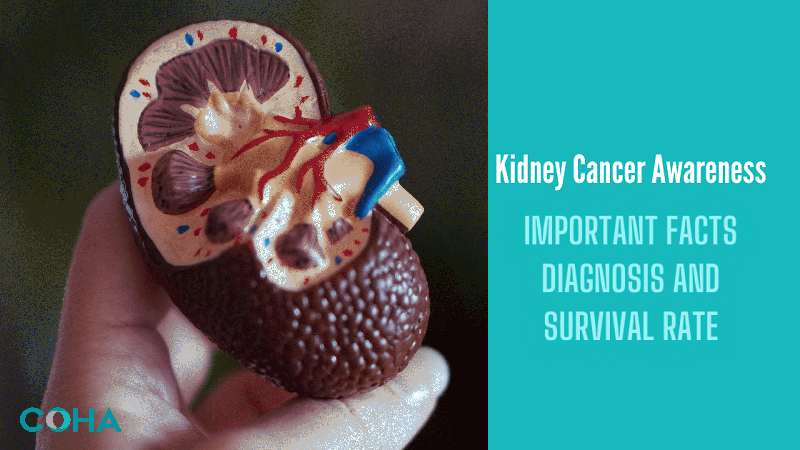


Kidney cancer often develops in tubules that help filter the blood and excrete waste. Cancer develops when cells in the tubules’ lining start growing uncontrollably. Kidney cancer is the 6th most common cancer for men and the 8th most common cancer for women. This year, it's projected that about 73,750 people in the United States will be diagnosed with kidney cancer, and 14,830 people will die from it. The 5-year survival rate of this cancer is 75%, but it varies according to several factors. Here’s everything you need to know about kidney cancer.
Contributing to 85% of diagnoses, renal cell carcinoma remains the most common type of kidney cancer. It develops in the proximal renal tubules that help for kidney’s filtration system. The localized survival rate is 93%, the regional rate is 70%, and the distant rate is 13%.
It contributes to 5-10% of kidney cancer diagnosis and develops in the renal pelvis (where urine collects before moving to the bladder). It's curable in over 90% of patients whose tumors are superficial and confined to the ureter or renal pelvis.
Sarcoma is the rare kidney cancer developing in the surrounding fat or capsule (the thin, soft tissue of the kidney), and its overall 5-year survival rate is 65%.
It contributes to 1% of kidney cancer and is most common in children. The survival rate is 93% for Wilms Tumor among children depending on the stage of the disease.
Lymphoma can enlarge both kidneys and is associated with enlarged lymph nodes (lymphadenopathy) in other parts of the body, including the abdominal cavity, chest, and neck. Rarely it appears as a lone tumor mass in the kidney. Depending on the stage, the overall survival rate for this cancer is 73%.
About 70% of individuals are affected by clear cells that range from slow-growing (grade 1) to fast-growing (grade 4). Its 5-year survival rate is 50-69%.
It affects 10 to 15% of patients and has two subtypes called type 1 (localized papillary kidney cancer)and type 2 (metastatic papillary kidney cancer). Its 5-year survival rate is significantly less for people with stage 4 cancer as compared to the higher rates for earlier stages.
A tumor with sarcomatoid features is an aggressive form of kidney cancer that develops in the soft tissue. The 5-year survival rate for this cancer is 65%.
This rare, highly aggressive cancer is associated with sickle cell disease and sickle cell trait and is considered a renal cortical tumor. This type of cancer cell is associated with lower survival rates.
It develops in the kidney’s collecting ducts and is common in people aged 20 and 30, about one-third of patients with this cancer cell face metastases. It has a survival rate for all stages at one year at 69% and 45% for three years.
This uncommon cancer cell may form indolent tumors that are improbable to spread but are aggressive if they do. Its 5-year survival rate is below 87%.
It is a slow-growing kidney cancer that rarely spreads.
It is a benign tumor that is less likely to spread.
The stages of kidney cancer are based on how far cancer has spread.
The tumor is usually 7 cm or smaller and is limited to the kidney. Its 5-year survival rate is 81%.
The cancer is limited to the kidney, but the tumor is more than 7 cm. Its 5-year survival rate is 74%.
Stages 3 and 4 signify that cancer has spread to other body parts.
The cancer spreads to the lymph node near the kidney or fatty tissue or the main blood vessel around the kidney. Its 5-year survival rate is 53%.
The cancer spreads to the adrenal gland over the kidney or another organ or distant lymph nodes. Its 5-year survival rate is 8-12%.
Earlier diagnosis and treatment help cure kidney cancer and improve its survival rate. The 5-year survival rate of people diagnosed when cancer is contained to the kidney is 93%. However, it is 70% for people diagnosed when cancer has spread to the regional lymph nodes and surrounding tissues or organs, and 12% for people diagnosed when cancer has spread to distant body parts.
Blood and urine tests, biopsy, and imaging tests like CAT scans, MRIs, x-rays, cystoscopy, and nephro-ureteroscopy are used to diagnose kidney cancer. The choice of test depends on the cancer type, the signs and symptoms of the disease, the patient’s age, and medical condition.
Contact Chesapeake Oncology Hematology Associates today if you have any questions regarding kidney cancer.
Kidney cancer may not cause any health-impacting symptoms in the early stages. However, when the condition progresses, there are symptoms such as:
Yes, it can spread to the lungs and surrounding organs which is known as metastatic kidney cancer.
Depending on your risk factors, it is good to have periodical screenings for kidney cancer. The known risk factors of kidney cancer are:
Also Read: Everything You Need to Know About Multiple Myeloma